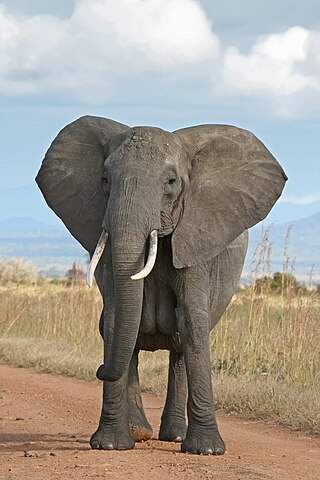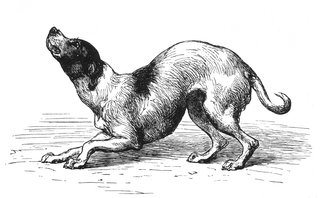Related Research Articles

Elephants are the largest living land animals. Three living species are currently recognised: the African bush elephant, the African forest elephant, and the Asian elephant. They are the only surviving members of the family Elephantidae and the order Proboscidea; extinct relatives include mammoths and mastodons. Distinctive features of elephants include a long proboscis called a trunk, tusks, large ear flaps, pillar-like legs, and tough but sensitive grey skin. The trunk is prehensile, bringing food and water to the mouth and grasping objects. Tusks, which are derived from the incisor teeth, serve both as weapons and as tools for moving objects and digging. The large ear flaps assist in maintaining a constant body temperature as well as in communication. African elephants have larger ears and concave backs, whereas Asian elephants have smaller ears and convex or level backs.

Musth or must is a periodic condition in bull (male) elephants characterized by aggressive behavior and accompanied by a large rise in reproductive hormones. It has been known in Asian elephants for 3000 years but was only described in African elephants in 1981. There is evidence that similar behaviour occurred in extinct proboscideans like gomphotheres and mastodons.
Amboseli National Park, formerly Maasai Amboseli Game Reserve, is a national park in Loitoktok District in Kajiado County, Kenya. It is 39,206 ha (392.06 km2) in size at the core of an 8,000 km2 (3,100 sq mi) ecosystem that spreads across the Kenya-Tanzania border. It harbours 400 species of birds including water birds like pelicans, kingfishers, crakes, hamerkop and 47 raptor species. The local people are mainly Maasai.

African elephants are members of the genus Loxodonta comprising two living elephant species, the African bush elephant and the smaller African forest elephant. Both are social herbivores with grey skin. However, they differ in the size and colour of their tusks as well as the shape and size of their ears and skulls.
The White Bone is a Canadian novel written by Barbara Gowdy and published by HarperCollins in 1999. It was nominated for the Scotiabank Giller Prize in 1998. Sometimes compared to Richard Adams's Watership Down, it is an adult fantasy story about animals—in this case, African elephants—in a realistic natural setting but given the ability to speak to one another throughout the book. Subsequently, the elephants are given anthropomorphized personalities and have created their own religion, folklore, and customs, all based on the author's research on elephant behavior.

Emotion is defined as any mental experience with high intensity and high hedonic content. The existence and nature of emotions in non-human animals are believed to be correlated with those of humans and to have evolved from the same mechanisms. Charles Darwin was one of the first scientists to write about the subject, and his observational approach has since developed into a more robust, hypothesis-driven, scientific approach. Cognitive bias tests and learned helplessness models have shown feelings of optimism and pessimism in a wide range of species, including rats, dogs, cats, rhesus macaques, sheep, chicks, starlings, pigs, and honeybees. Jaak Panksepp played a large role in the study of animal emotion, basing his research on the neurological aspect. Mentioning seven core emotional feelings reflected through a variety of neuro-dynamic limbic emotional action systems, including seeking, fear, rage, lust, care, panic and play. Through brain stimulation and pharmacological challenges, such emotional responses can be effectively monitored.

Anecdotal cognitivism is a method of research using anecdotal, and anthropomorphic evidence through the observation of animal behaviour.
Lawrence Anthony was a South African conservationist, environmentalist, explorer and author. He was the long-standing head of conservation at the Thula Thula animal reserve in Zululand, South Africa, and the Founder of The Earth Organization, a privately registered, independent, international conservation and environmental group. He was an international member of the Explorers Club of New York and a member of the National Council of the Southern Africa Association for the Advancement of Science.

Elephant cognition is animal cognition as present in elephants. Most contemporary ethologists view the elephant as one of the world's most intelligent animals. With a mass of around 5 kg (11 lb), an elephant's brain has more mass than that of any other land animal, and although the largest whales have body masses twenty times those of a typical elephant, a whale's brain is barely twice the mass of an elephant's brain. In addition, elephants have around 257 billion neurons. Elephant brains are similar to those of humans and many other mammals in terms of general connectivity and functional areas, with several unique structural differences. Although initially estimated to have as many neurons as a human brain, the elephant's brain has about three times the amount of neurons as a human brain, this is in addition to their brain being about four times the size of a human's. However, the elephant's cerebral cortex has about one-third of the number of neurons as a human's cerebral cortex.

The African bush elephant, also known as the African savanna elephant, is one of two extant African elephant species and one of three extant elephant species. It is the largest living terrestrial animal, with bulls reaching an average shoulder height of 3.04–3.36 metres (10.0–11.0 ft) and a body mass of 5.2–6.9 tonnes (11,500–15,200 lb), with the largest recorded specimen having a shoulder height of 3.96 metres (13.0 ft) and an estimated body mass of 10.4 tonnes (22,900 lb).
Cynthia Jane Moss is an American ethologist and conservationist, wildlife researcher, and writer. Her studies have concentrated on the demography, behavior, social organization, and population dynamics of the African elephants of Amboseli. She is the director of the Amboseli Elephant Research Project, and is the program director and trustee for the Amboseli Trust for Elephants (ATE).

Marc Bekoff is an American biologist, ethologist, behavioral ecologist and writer. He is Professor Emeritus of Ecology and Evolutionary Biology at the University of Colorado Boulder and cofounder of the Jane Goodall Institute of Ethologists for the Ethical Treatment of Animals, and cofounder of the Jane Goodall Roots and Shoots program.
In education, affect is broadly defined as the attitudes, emotions, and values present in an educational environment. The two main types of affect are professional affect and student affect. Professional affect refers to the emotions and values presented by the teacher which are picked up by the student, while student affect refers to the attitudes, interests, and values acquired in the educational environment. While there is the possibility of overlap between student and professional affect, the terms are rarely used interchangeably by educational professionals, with student affect being reserved primarily for use to describe developmental activities present in a school which are not presented by the teacher.

An Apology to Elephants is a 2013 documentary that explores abuse and brutal treatment of elephants. It showcases elephant training and the psychological trauma and physical damage done by living conditions in some zoos and circuses. It was premiered on HBO on April 22, 2013, also celebrated as an Earth Day. The documentary includes interviews with environmental activists and biologists, including Performing Animal Welfare Society co-founders Ed Stewart and Pat Derby. The film was dedicated to Derby, also known as an "elephant lady", who died on February 15, 2013.
The Amboseli Elephant Research Project is a long-term research project on the ethology of the African elephant, operated by the nonprofit Amboseli Trust for Elephants. The project studies the elephant's social behavior, age structure and population dynamics. It is the longest running study of elephant behavior in the wild, and has gathered data on life histories and association patterns for more than 2,000 individual elephants.
Empathy in chickens is the ability of a chicken to understand and share the feelings of another chicken. The Biotechnology and Biological Sciences Research Council's (BBSRC) Animal Welfare Initiative defines and recognizes that "...hens possess a fundamental capacity to empathise..." These empathetic responses in animals are well documented and are usually discussed along with issues related to cognition. The difference between animal cognition and animal emotion is recognized by ethicists. The specific emotional attribute of empathy in chickens has not been only investigated in terms of its existence but it has applications that have resulted in the designed reduction of stress in farm-raised poultry.
Joyce Hatheway Poole is a biologist, ethologist, conservationist, and co-founder/scientific director of ElephantVoices. She is a world authority on elephant reproductive, communicative, and cognitive behavior.

The Elephant Queen is a 2018 documentary film directed by Victoria Stone and Mark Deeble, and narrated by Chiwetel Ejiofor. It tells the journey of a family of elephants in the African savannah when they are forced to leave their waterhole. The film was produced by Lucinda Englehart under the banner of Deeble & Stone.

Elephant is a 2020 American nature documentary film about elephants directed by Mark Linfield and Vanessa Berlowitz and narrated by Meghan, Duchess of Sussex. It is the fifteenth nature documentary to be released under the Disneynature label. The film was released alongside Dolphin Reef as a Disney+ exclusive on April 3, 2020.

Elephants communicate via touching, visual displays, vocalisations, seismic vibrations, and semiochemicals.
References
- 1 2 "Echo the African Bush Elephant". BBC Nature. Retrieved 24 March 2013.
- 1 2 3 "An Elephant to Remember". PBS. 16 February 2012.
- ↑ "Echo: An Elephant to Remember | Cynthia Moss, Echo, and the Amboseli Elephants | Nature | PBS". Nature. 2010-10-12. Retrieved 2020-05-26.
- ↑ "Unforgettable Elephants | Echo's Family Tree | Nature | PBS". Nature. 2008-02-18. Retrieved 2020-05-26.
- ↑ Moss, Cynthia, "A Passionate Devotion", Armstrong, S & Botzler, R.G., An Animal Ethics Reader, Routledge, 2003, p. 101.
- ↑ Bekoff, Marc (2002). Minding Animals : Awareness, Emotions, and Heart: Awareness, Emotions, and Heart . New York, N.Y.: Oxford University Press. p. 101. ISBN 9780195150773.
- ↑ Moss, Cynthia (January 2011). "History of the EB Family" (PDF). Archived from the original (PDF) on 2 February 2011.